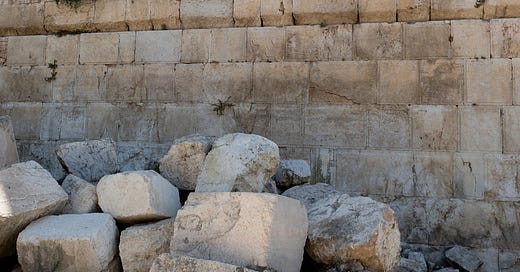Ancient memories of past tragedies, urgent prayers for peace.
Israel’s enemies know the Jewish calendar all too well. It is highly likely that Hezbollah and Iran will launch their promised attack on Israel this evening and/or tomorrow (Aug. 12-13). That’s because the dates coincide with the saddest day on the Jewish calendar, Tisha B’Av (the ninth day of the Hebrew month of Av). It marks the date of the destruction of the first Holy Temple in Jerusalem by the Babylonians in 586 B.C.E. and the second Holy Temple at the hands of the Romans in 70 A.D., and the expulsion of the Jews from the holy land.
The day of mourning, marked by fasting and prayer, is also associated with other tragedies in Jewish history, including the expulsion of the Jews from England in 1290 and from Spain in 1492.
It was no accident that Egypt and other Arab armies launched the Yom Kippur War in 1973 on the holiest day of the Jewish year, when many Jews were fasting and at prayer at synagogues throughout the land. Fifty years later, Hamas chose its brutal attack on Israeli civilians – men, women and children – for last October 7, a Shabbat that was also the holiday of Simchat Torah, a joyous occasion when families are in the synagogue.
The association of tragic assaults and attempts to eradicate Jewish communities over a period of more than 2,000 years is a painful reminder of the long history of anti-Semitism. Today it’s important to note that Iran and its proxies, including Hezbollah in Lebanon, Hamas in Gaza and the Houthis of Yemen, are committed to Israel’s destruction for ideological and spiritual reasons, believing Jews have no right to live in the region. Somehow, many Americans, and especially young people deeply devoted to democratic ideals, support those who have sworn to eradicate a people – the very definition of genocide – guilty of being Jews. The fact is that the zeal of Israel’s enemies is not about creating two states but eliminating one state.
With it all, though, Jewish history remains a story of the resilience of a people who have survived longer than any other. May this Tisha B’Av be not only a day of mourning past tragedies but also of reflection and renewal, and faith in the future.
Am Yisrael Chai.





B. Eisenberg
Frankly. I don't see how you can say: "Somehow, many Americans, and especially young people deeply devoted to democratic ideals, support those who have sworn to eradicate a people – the very definition of genocide – guilty of being Jews." How can they be deeply devoted to democratic ideals if they support those who have sworn to eradicate a people.?They may be devoted to something but they certainly aren't devoted to democratic ideals.
August 12-13, not June.